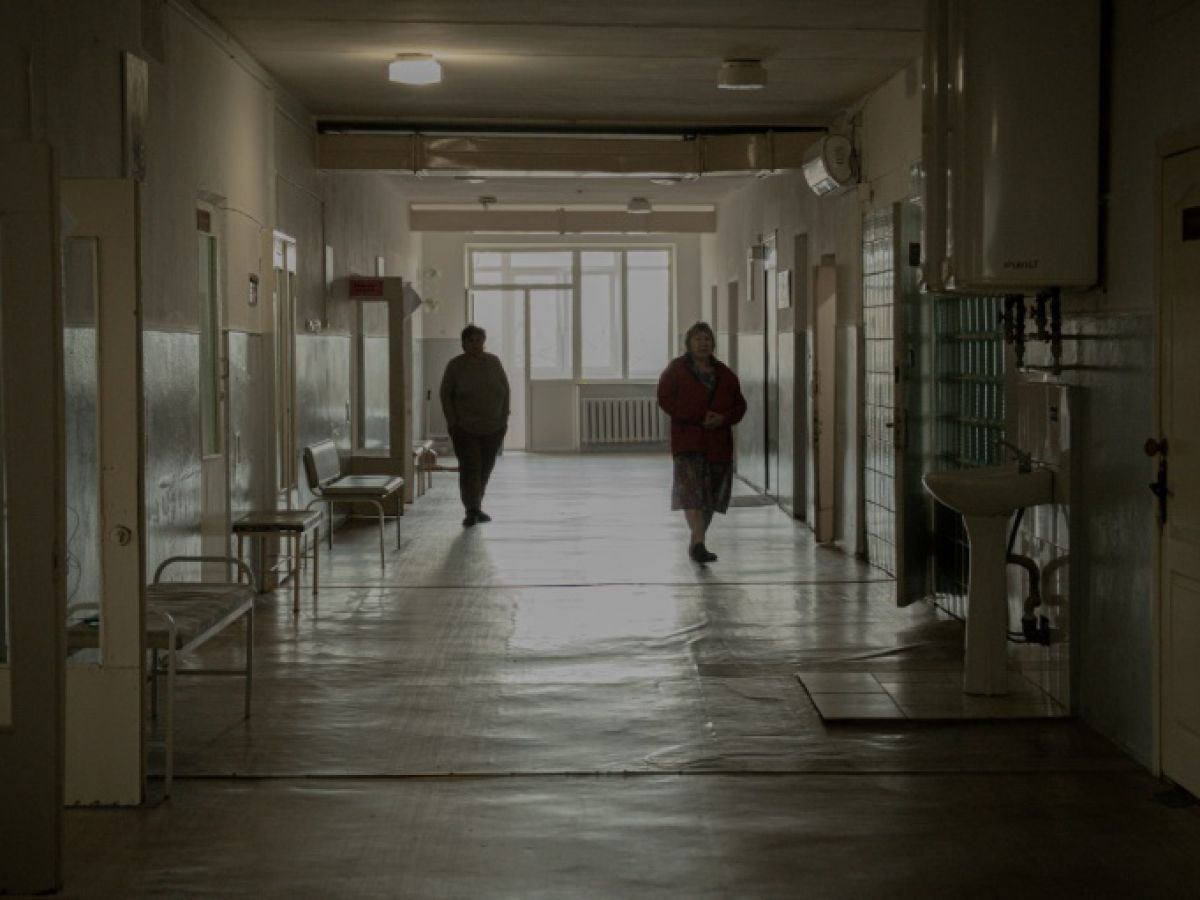At night, when Russian drones and missiles pierce the sky and Ukrainian air defenses thunder, Olga Klimova sleeps soundly, far from home, in the crowded room of a psychiatric hospital.
"I take the medication, I sleep, I don't hear anything," laughs this toothless woman with a bright laugh.
Ms. Klimova, 44, is hospitalized in Poltava, central Ukraine, and suffers from schizophrenia, a condition with highly variable symptoms that frequently causes sleep disturbances.
In her dreams, when she sleeps, Olga Klimova says she sees her village of Kysselivka, in the Kherson region (south), from where she was evacuated after the start of the Russian invasion three years ago.

She claims to have "no news" of her relatives who remained there, such as "her old aunt", and is waiting for "the end of the war" to find them.
– Saturation –
According to doctors interviewed by AFP, the war has led to the evacuation of thousands of patients from Ukrainian psychiatric hospitals. They are among the 4.6 million internally displaced persons registered by Kyiv.
At the same time, the unprecedented brutality of the conflict triggered new psychological disorders among soldiers and civilians: post-traumatic stress, depression, suicidal tendencies and other illnesses.
According to the World Health Organization (WHO), 9.6 million Ukrainians are at risk of or living with a mental health problem – almost a quarter of the pre-war population.
The public psychiatric system, already outdated and underfunded before 2022, is becoming overcrowded.

In Poltava, psychiatrist Oles Teliukov, 56, confirms that he has "more work" and knows that he will have "even more" when the conflict ends.
By mid-March, its women's unit, which was designed to accommodate 40 patients, had 47. Hospitalizations there generally last a few weeks to treat "acute crises."
Most patients are then referred to psychologists and social workers. Only a few survivors remain in care for long.
– Relapses –
About 101,000 of the 712 patients in the Poltava psychiatric hospital were displaced as of mid-March, mainly from the devastated regions of Kherson, Donetsk, Lugansk and Kharkiv.
Among them are evacuees from Kherson, a city that has been under constant bombardment by Russia since its liberation by the Ukrainian army in November 2022.

Such violence, according to Mr. Teliukov, can exacerbate existing mental illnesses. The devastation caused by the invasion also hinders access to treatments, often expensive and imported, to stabilize illnesses and prevent relapses.
Suffering from schizophrenia, Olga Beketova, 49, says she was a victim of the severe shortages at the beginning of the war. For several weeks, she was without medication.
In May 2022, she suffered a seizure at home and was hospitalized in Kherson, then evacuated to Poltava. Her gaze fixed, Ms. Beketova slowly recounts having a stroke in 2024, which she attributes "to all that anxiety."
– “Little flames” –

French physician Christian Carrer is the founder of the humanitarian organization AICM, which helps 257 Ukrainian medical institutions, including 15 psychiatric hospitals.
In March, his NGO delivered food, equipment and treatments for "epilepsy, general and schizophrenic seizures" and to restore "sleep and meal cycles" to the Poltava hospital.
Due to a lack of resources, Christian Carrer observes, Ukrainian psychiatrists are "putting" their patients to sleep with inappropriate sedatives. "We have delivered products that reduce the effects of schizophrenia, or any dangerous tendency, but without making them stupefied," he explains.
Ukraine began modernizing its healthcare system in 2017. Interrupted by the war, this reform did not extend to psychiatric hospitals, which are still organized in the Soviet style, with large rooms containing dozens of patients, says Carrer.

Many patients – adults and children alike – spend their days lying there, inactive. Christian Carrer calls them "little flames": "People who are there without being there."
– “Destigmatize” –
In his office, Dr. Telioukov talks about two soldiers he treated: one traumatized by a bombing in Poltava in September 2024 (59 dead), the other by six months of detention in a Russian prison.
He believes that she suffered sexual violence, like many Ukrainian prisoners. However, "she did not fully confide."
The doctor points to the rooms he's in charge of. They don't have numbers, as is often the case, but rather color-coded names.
"It's to de-stigmatize, to get rid of bureaucracy!" says the energetic psychiatrist.
In the "Rose" room, they look for Olga Klimova to say goodbye. They find her bedridden, at the back left, surrounded by about ten patients. When she sees the AFP team, she raises her hand and gives a big smile.

